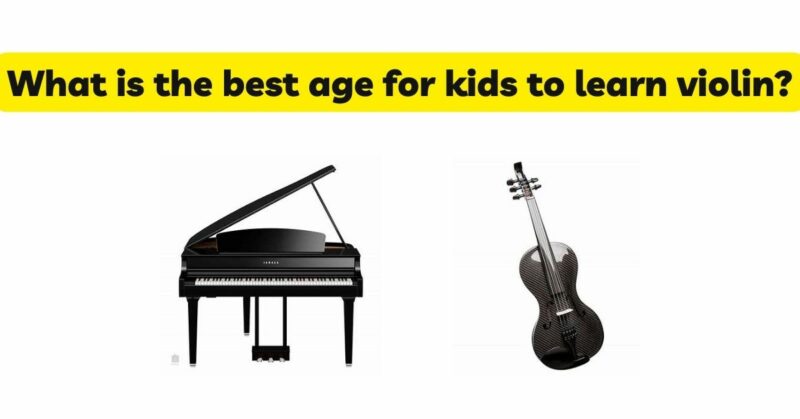The violin is a captivating and versatile instrument that has enthralled audiences for centuries. As parents, we often wonder when is the best time to introduce our children to the violin and set them on a path of musical discovery. While there is no one-size-fits-all answer, various factors can influence the ideal age to commence violin lessons. In this article, we will explore the considerations surrounding the age at which children can embark on their violin journey, enabling parents to make an informed decision that maximizes their child’s musical potential.
I. The Importance of Physical Development
- Motor Skills and Coordination: Playing the violin requires fine motor skills, including precise finger placement, bowing technique, and hand-eye coordination. Young children undergo significant physical development during their early years, and their motor skills continue to refine as they grow. Starting violin lessons too early, before the child has developed the necessary dexterity and coordination, can lead to frustration and hinder their progress. Most experts recommend waiting until a child is at least 4 to 6 years old before introducing them to the violin.
- Hand Size and Finger Strength: The size of a child’s hands and fingers is another crucial factor. The violin’s neck and fingerboard demand a certain level of finger strength and flexibility to produce clear notes and navigate the instrument’s range. Starting too early when a child’s hands are still small may pose challenges and limit their ability to fully engage with the instrument. Waiting until the child’s hands have grown and gained more strength can ensure a more comfortable and effective learning experience.
II. Cognitive and Emotional Readiness
- Attention Span and Concentration: Learning the violin requires sustained focus, attention to detail, and the ability to follow instructions. Young children naturally have shorter attention spans, and their ability to concentrate for extended periods develops over time. Starting violin lessons when a child is developmentally ready to engage in focused practice sessions can enhance their learning experience and help them progress more effectively.
- Emotional Maturity and Commitment: Playing the violin demands discipline, perseverance, and commitment. It is essential to assess a child’s emotional maturity and their willingness to invest time and effort into practicing and overcoming challenges. Starting violin lessons when a child is emotionally ready and displays a genuine interest in the instrument increases their motivation and sets the stage for a positive and rewarding musical journey.
III. Music Readiness and Preparatory Skills
- Musical Background and Exposure: Children who have had prior exposure to music, such as singing, playing other instruments, or attending music classes, tend to have a more developed sense of rhythm, pitch, and musical expression. This familiarity with music can facilitate the learning process when starting the violin. However, it is important to note that prior musical experience is not a prerequisite for beginning violin lessons, as the violin itself can be a child’s first introduction to the world of music.
- Readiness for Formal Instruction: Formal violin lessons involve structured learning, adherence to practice routines, and guidance from a teacher. It is important to consider whether a child is receptive to instruction and capable of following a teacher’s guidance. Some children may thrive in a formal instructional setting, while others may prefer a more exploratory and playful approach to learning music. Assessing a child’s readiness for formal instruction is crucial in determining the best age to start violin lessons.
IV. Individual Factors and Personalization
- Individual Differences and Learning Styles: Every child is unique, with their own set of strengths, preferences, and learning styles. Some children may display an exceptional interest and aptitude for the violin at a young age, while others may require more time to develop their musical inclination. It is essential to consider a child’s individual factors and tailor their violin learning experience accordingly. Assessing their readiness, motivation, and level of engagement can guide parents in determining the most appropriate age to commence violin lessons.
- Parental Support and Involvement: Parental support plays a vital role in a child’s musical journey. Younger children may require more hands-on parental involvement during practice sessions, ensuring a consistent and positive learning environment. Assessing the parents’ readiness and availability to actively participate in the child’s violin education can impact the decision regarding the ideal age to begin lessons.
Conclusion:
While the ideal age for a child to begin learning the violin varies from child to child, there are several factors to consider when making this decision. Physical development, cognitive readiness, musical exposure, and individual factors all play a crucial role in determining the optimal time to introduce the violin. By assessing these factors and recognizing a child’s unique qualities, parents can make an informed choice that sets the stage for a fulfilling and successful violin journey. Above all, fostering a love for music, providing a supportive environment, and nurturing a child’s passion and curiosity will be the key factors in ensuring their musical growth and enjoyment.


